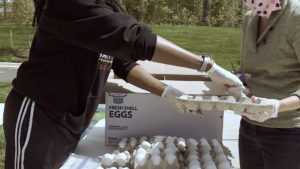As COVID-19 began to sweep across the world in March, our church brainstormed ideas for a gospel-shaped response to the pandemic. The Lord brought to mind Eusebius of Caesarea’s words from a time when the world was struck by famine and disease:
In this awful adversity [Christians] alone gave practical proof of their sympathy and humanity. All day long some of them tended to the dying and to their burial, countless numbers with no one to care for them. Others gathered together from all parts of the city a multitude of those withered from famine and distributed bread to them all, so that their deeds were on everyone’s lips, and they glorified the God of the Christians.
With this vision, our church stepped out in faith, which in turn led to an incredible outpouring of generosity through many other gospel-centered churches in Anne Arundel County, Maryland.
Jesus’s feeding of the 4,000 in Matthew 15:32–39 offers a simple framework for how local churches might take simple next steps to love their local contexts. To be sure, proclaiming the gospel must remain central and the priority—announcing the good news that through the cross of Christ, God reconciles sinners to himself (Rom. 5:10). But this good news has implications for how we live in the world and serve the needy around us (James 2:14–17). Whether a need arising from the pandemic and subsequent recession, or something else, churches can rise up to love their neighbors by following Jesus’s own example, compelled by grace.
Discover Local Needs
In Matthew 15:32, Jesus identified a local need before him. People were hungry. With a global crisis like COVID-19, it might be tempting to focus on the headlines coming in from around the nation and world. But local churches should start by looking at the needs closest to home.
Local churches should start by looking at the needs closest to home.
At the start of the pandemic we reached out to our county and asked about actual pressing needs in our area. We learned that a Latino community near our church was hit particularly hard, with 75 percent of the families from the local elementary school quickly losing their entire income. The county recommended pop-up pantries as the most significant way we could serve this community in the near term. Providentially, our church already knew of this community and had been serving the school pre-pandemic.
Discern a Plan
 Once Jesus identified a need, he immediately began to process with his team (Matt. 15:33–34). He wasn’t willing to send the people away hungry, so the question turned to how to feed them.
Once Jesus identified a need, he immediately began to process with his team (Matt. 15:33–34). He wasn’t willing to send the people away hungry, so the question turned to how to feed them.
When we discovered the need of the vulnerable community near us, we brought it back to our team. We prayed and considered how we might respond. One leader boldly recommended we devote our upcoming Easter Sunday offering to this community in need (including any gifts given to our church for the following Easter Week).
Demonstrate Radical Grace
After seeing the need and identifying a plan, Jesus moves to action (Matt. 15:35–38). He performs a miracle: multiplying loaves and fish to satisfy the hunger of the throng (with plenty leftover).
What the Lord did in our church was nothing short of a miracle. People gave more than $30,000 (more than half of our average monthly giving). Even friends and neighbors who do not identify as Christian gave to the cause. This allowed us to start a weekly pop-up pantry that supplied a week’s worth of groceries to about 300 families and 1,200 individuals each Saturday morning. We partnered with the elementary school and a number of other organizations and local restaurants. It was a beautiful collaboration.
Even more miraculous is that, as news spread, a coalition of gospel-centered churches came together (Love AACO) to begin additional pop-up pantries across our county. To date, more than 60,000 individuals have been served a week’s worth of groceries through this initiative. It wasn’t our brilliance or creativity that brought about these results. Rather, it was our willingness to be used by God and to serve others. We have been humbled and grateful to be part of his work!
How Might Your Church Respond?
In the end the Lord satisfied not only our neighbors in need, but also our hearts in Christ. The local churches of our county have been encouraged, unified, and activated into mission as a profound witness (John 17:20–22) to the watching world. The weekly pop-up pantries became a space to embody and speak the gospel to many who would not step foot in a church door. The Lord even used our actions, in small ways, to improve the reputation of Christ’s church among some skeptics. One woman commented in a planning meeting, “I have never been one for organized religion, but the Christians have really shown up.”
The horrific and ongoing effect of the COVID-19 pandemic provides churches a unique moment to obey Jesus Christ in radical ways. Our church’s response with the pop-up pantries is just one example of what can happen when followers of Jesus in local churches put their creativity and resources to use in acts of gospel-driven mercy, justice, and compassion.
The horrific and ongoing effect of the COVID-19 pandemic provides churches a unique moment to obey Jesus Christ in radical ways.
Whatever happens in 2021 with the pandemic, one thing is certain: There will always be needs, pain, and suffering in our communities. How might your church respond, following the example of Jesus in Matthew 15, to discover needs, discern a plan, and demonstrate radical grace?
When the history of the COVID-19 pandemic is written, may it be said, as was in Eusebius’s day, that “everyone’s lips were glorifying the God of the Christians.”
Read More
The Gospel Coalition
